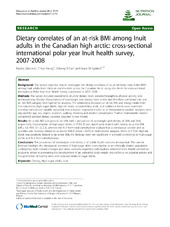Dietary correlates of an at-risk BMI among Inuit adults in the Canadian high arctic: cross-sectional international polar year Inuit health survey, 2007-2008
Peer reviewed, Journal article
Published version
Permanent lenke
https://hdl.handle.net/1956/8690Utgivelsesdato
2012-09-18Metadata
Vis full innførselSamlinger
Originalversjon
https://doi.org/10.1186/1475-2891-11-73Sammendrag
Background: The study’s objective was to investigate the dietary correlates of an at-risk body mass index (BMI) among Inuit adults from thirty-six communities across the Canadian Arctic using data from the cross-sectional International Polar Year Inuit Health Survey, conducted in 2007–2008. Methods: The survey included assessments of 24-hr dietary recall, sociodemographics, physical activity, and anthropometry. Dietary characteristics of overweight and obesity were similar and therefore combined into one at- risk BMI category (≥25 kg/m2) for analyses. The relationship between an at-risk BMI and energy intake from macronutrients, high sugar drinks, high-fat foods, saturated fatty acids, and traditional foods were examined entering each dietary variable separately into a logistic regression model as an independent variable. Analyses were adjusted for age, sex, region, kcalories, walking, smoking and alcohol consumption. Further multivariable models considered selected dietary variables together in one model. Results: An at-risk BMI was present for 64% with a prevalence of overweight and obesity of 28% and 36%, respectively. Consumption of high-sugar drinks (>15.5% E) was significantly related with having an at-risk BMI (OR = 1.6; 95% CI 1.2; 2.2), whereas the % E from total carbohydrate evaluated as a continuous variable and as quartiles was inversely related to an at-risk BMI (P -trend < 0.05) in multivariable analyses. While % E from high-fat foods was positively related to an at-risk BMI, the findings were not significant in a model controlling for high-sugar drinks and % E from carbohydrates. Conclusions: The prevalence of overweight and obesity is of public health concern among Inuit. The current findings highlight the obesogenic potential of high-sugar drink consumption in an ethnically distinct population undergoing rapid cultural changes and raises concerns regarding carbohydrate restricted diets. Health promotion programs aimed at preventing the development of an unhealthy body weight should focus on physical activity and the promotion of healthy diets with reduced intake of sugar drinks.
Utgiver
BioMed CentralTidsskrift
Nutrition JournalOpphavsrett
Copyright 2012 Zienczuk et al.; licensee BioMed Central LtdNatalia Zienczuk et al.; licensee BioMed Central Ltd.

